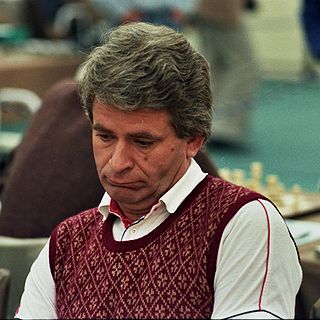
Boris Vasilievich Spassky is a Russian and former Soviet chess grandmaster who was the tenth World Chess Champion, holding the title from 1969 to 1972. Spassky played three world championship matches: he lost to Tigran Petrosian in 1966; defeated Petrosian in 1969 to become world champion; then lost to Bobby Fischer in a famous match in 1972.

Jørgen Bent Larsen was a Danish chess grandmaster and author. Known for his imaginative and unorthodox style of play, he was the second-strongest non-Soviet player, behind only Bobby Fischer, for much of the 1960s and 1970s. He is considered to be the strongest player born in Denmark and the strongest from Scandinavia until the emergence of Magnus Carlsen.
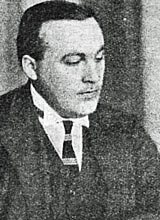
Efim Bogoljubow, also known as Efim Dimitrijewitsch Bogoljubow, was a Russian-born German chess grandmaster.

Wolfgang Unzicker was one of the strongest German chess Grandmasters from 1945 to about 1970. He decided against making chess his profession, choosing law instead. Unzicker was at times the world's strongest amateur chess player, and World Champion Anatoly Karpov called him the "world champion of amateurs".

Robert Eugene Byrne was an American chess player and chess author who held the FIDE title of Grandmaster (GM). He won the U.S. Championship in 1972, and was a World Chess Championship Candidate in 1974. Byrne represented the United States nine times in Chess Olympiads from 1952 to 1976 and won seven medals. He was the chess columnist from 1972 to 2006 for The New York Times, which ran his final column on November 12, 2006. Byrne worked as a university professor for many years, before becoming a chess professional in the early 1970s.
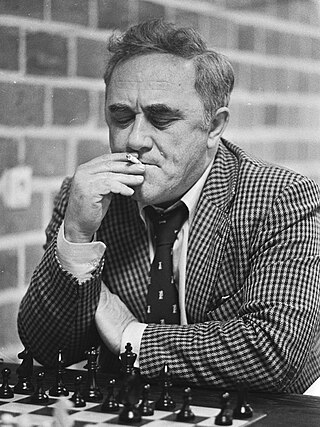
Efim Petrovich Geller was a Soviet chess player and world-class grandmaster at his peak. He won the Soviet Championship twice and was a Candidate for the World Championship on six occasions. He won four Ukrainian SSR Championship titles and shared first in the 1991 World Seniors' Championship, winning the title outright in 1992. His wife Oksana was a ballet dancer while his son Alexander was also a chess master. Geller was coach to World Champions Boris Spassky and Anatoly Karpov. He was also an author.

Lajos Portisch is a Hungarian chess Grandmaster, whose positional style earned him the nickname, the "Hungarian Botvinnik". One of the strongest non-Soviet players from the early 1960s into the late 1980s, he participated in twelve consecutive Interzonals from 1962 through 1993, qualifying for the World Chess Championship Candidates Cycle a total of eight times. Portisch set several all-time records in Chess Olympiads. In Hungarian Chess Championships, he either shared the title or won it outright a total of eight times. He won many strong international tournaments during his career. In 2004, Portisch was awarded the title of 'Nemzet Sportolója', Hungary's highest national sports achievement award.

Robert Graham Wade, known as Bob Wade, was a New Zealand and English chess player, writer, arbiter, coach, and promoter. He was New Zealand champion three times, British champion twice, and played in seven Chess Olympiads and one Interzonal tournament. Wade held the titles of International Master and International Arbiter.
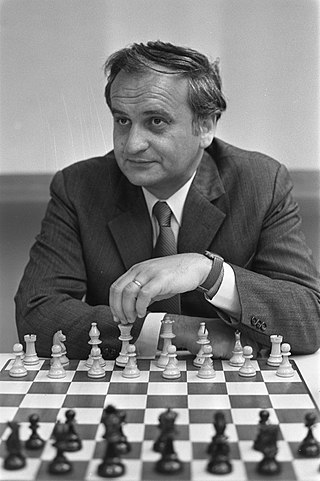
Borislav Ivkov was a Serbian chess Grandmaster. He was a World championship candidate in 1965, and played in four more Interzonal tournaments, in 1967, 1970, 1973, and 1979.

Albéric Joseph Rodolphe Marie Robert Ghislain O'Kelly de Galway was a Belgian chess Grandmaster (1956), an International Correspondence Chess Grandmaster (1962), and the third ICCF World Champion in correspondence chess (1959–1962). He was also a chess writer.
Paul Felix Schmidt was an Estonian and German chess player, writer and chemist.
Paul (Pablo) Michel was a German–Argentine chess master.

The 19th Chess Olympiad, comprising an open team tournament as well as the annual FIDE congress, took place between September 5–27, 1970, in Siegen, West Germany.

Carl Oscar Ahues was a German chess International Master.
Karl Gilg was a German chess International Master from Czechoslovakia.
Ludwig Roedl (Rödl) was a German chess master.
Herbert Heinicke was a German chess master.
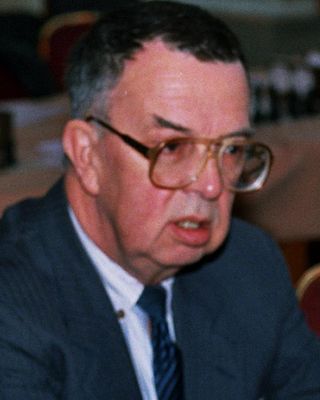
Nikolai Vladimirovich Krogius was a Russian chess Grandmaster, International Arbiter (1985), psychologist, chess coach, chess administrator, and author. He won several tournament titles at Sochi and in Eastern European events, and appeared in seven Soviet finals from 1958–71. His peak was in 1967 when he ranked 18th in the world for a time. He earned his doctorate in psychology, and specialized in sports psychology. He coached World Champion Boris Spassky for several years, also served as chairman of the USSR Chess Federation, and co-authored five chess books. He was the co-winner of the 1993 World Senior Chess Championship.
Gerhard Pfeiffer was a German chess master and chess problemist.
Walter Niephaus was a German chess master.













